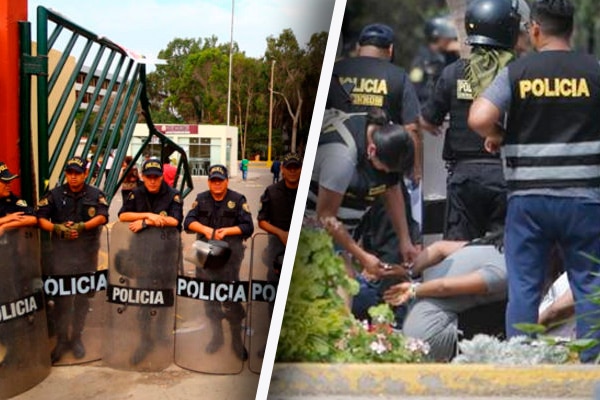Yesterday Peru was the protagonist of an act of total pettiness and abuse of power; but minutes later, it was also the protagonist of thousands of acts of solidarity with our brothers in the south.
Yes, yesterday, the government of President Dina Boluarte, with the protection of the police forces and the legal framework, used all its force to evict our brothers from the south who had come from various departments of the country to demand new elections for the Executive and Legislative. The message was clear: prevent the arrival of more demonstrators and put an end to social protest once and for all.
Peruvians were outraged to see how an excessive contingent of police and a military tank broke through the entrance to the Universidad Nacional Mayor de San Marcos, which was only marked by protest banners, to arrest and evict more than 100 demonstrators who were still on campus (since Thursday 19, many had moved to the Universidad Nacional de Ingeniería, because the deadline to stay on campus, set by the university’s rector Jeri Ramón Ruffner and the government, had expired). On that day, a contingent of approximately 500 police were also present, without any “act of vandalism” having taken place, but they were already trying to evict the demonstrators. Today, with the same modus operandi, they want to justify their interference by alleged acts of vandalism or by the arrival of more demonstrators).
It should be noted that another tank and several minibuses full of police were also stationed in front of the National University of Engineering (UNI), suggesting that the same thing would happen as in San Marcos. However, the rector of this university, Pablo Alfonso López-Chau, ensured that the university’s autonomy was respected (the university, using its autonomy, can reject the interventions of the Armed Forces and welcome the weak, and the weakest: the students who come to march and protest in a non-violent manner (…). This prevented entry, protecting the demonstrators. Today the Comptroller of the Republic is assessing if the rector committed the crime of embezzlement by disposing of public property (article 388 of the Penal Code).
Solidarity with the detainees
After the police entered, they proceeded to arrest all the demonstrators who were in the cloister in a non-violent manner. Neither the Ombudsman’s Office, nor the Public Prosecutor’s Office (as stipulated by law) nor anyone else was present to defend the detainees. Thus, 101 citizens were transferred to the DIRINCRI and 93 to the Prefecture located in jirón España and Alfonso Ugarte, in the centre of Lima.
The lack of guarantees for the detainees and the inhumane treatment as if they were criminals was the trigger for hundreds of Peruvians to gather at the Prefecture, where the demonstrators were transferred. It was a spontaneous and forceful response by hundreds of Peruvians to guarantee the human rights of the detainees.
The vigil went on until late at night and today, Sunday, the same mobilisation for the detainees is planned.
On the other hand, the San Marcos Institutional Agreement (a group of teachers of the San Marcos University) requested the resignation of the rector for the police entering the university city, respect for all citizens and that ‘the killing of Peruvians with the brutal repression’ cease.
National strike on Monday 23rd
These events took place while the National Assembly of the Peoples (ANP) (the group that unites the organisation of the current marches) announced, through its national coordinator Marino Flores Gonzales, that this Monday 23rd a new National Strike will begin with the same demands: resignation and trial of President Dina Boluarte, a Constituent process based on a consultative referendum, closure of the Congress of the Republic, new elections with a new Political Constitution and the release from prison of former president Pedro Castillo.










